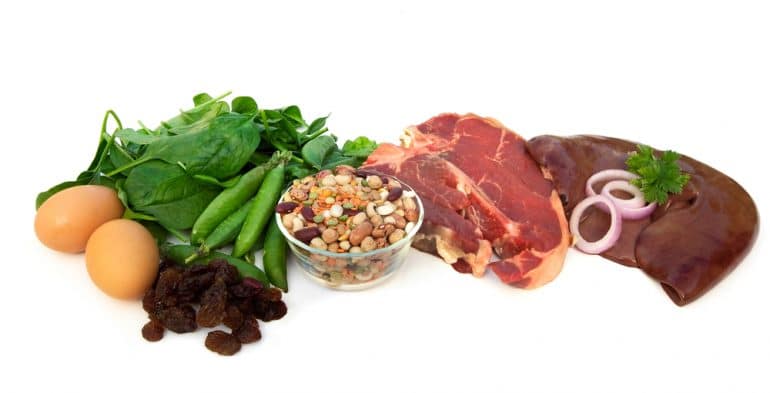
Low iron levels in pregnancy
If you have been diagnosed with low iron levels in your pregnancy, this is not uncommon. Because of the increased demands on your body and the increase in blood volume, low iron is a very common condition in pregnancy. You may experience symptoms in that you may feel tired, have headaches, get dizzy and have other symptoms of low iron or anaemia. By eating iron-rich foods, you can help prevent or combat low iron levels and anaemia in pregnancy and post birth.
Foods to eat to increase iron levels in pregnancy
- Red meat (be careful of liver because although rich in iron it also has high levels of Vitamin A which can cause problems in pregnancy)
- Dark, leafy greens (spinach, kale, watercress etc.)
- Dried fruit (apricots, prunes, raisins, figs)
- Beans and legumes
- Eggs (including the yolk)
- Fortified cereals and grains
The benefit of getting your iron from food is that you can typically absorb it better than pills and other supplements. It also does not cause the intestinal distress such as constipation that some medications may cause.
The best way to boost iron through food is to be sure to try to incorporate a few of these foods every day. For example, make your salads with mixed leafy greens and spinach. Snack on dried apricots or prunes. You can add these chopped to your oatmeal or cereal. Choose cereals which are fortified with iron and vitamins.
Red meat is an excellent way to boost your iron levels in pregnancy but the golden rule is to make sure that your meat is thoroughly cooked through to avoid the risks that rare or undercooked meat can cause in pregnancy.
What if you are a vegetarian with low iron in pregnancy
You do not have to eat meat to increase your iron intake. Simple and cheap meals such as bean burritos eaten at least once a week can help boost your iron intake and are generally good for you. If you are finding it difficult to plan meals, and it can be more difficult if you are avoiding meat, then the help of a good nutritionist may be just what you need to get back on track and make sure you have the best nutrition for your needs.
Tips to Increase Iron Intake and Absorption
Eating iron rich foods with Vitamin C can increase the amount of iron your body absorbs. Try a glass of orange juice with your fortified breakfast cereal or eating tomatoes and peppers with your steak You should avoid calcium when eating iron rich foods or taking iron supplements as they can interfere with absorption.
Taking Supplements for Anaemia
You will usually be screened for low iron or anaemia early in your pregnancy and again between 24-28 weeks. If you are anaemic or your iron levels are low, it is also important to note that you may be asked to take a supplement in addition to your recommended antenatal vitamins or you may be asked to take an alternative type to ensure you get all you need. Your doctor will advise on your individual case.
Unfortunately many iron supplements can make you feel constipated or your bowels feel sluggish. Not everyone responds well to supplements. Speak to your doctor to find what is right for you and you may need to try a variety of supplements, including some of the liquid variety until you find one that works for you.









